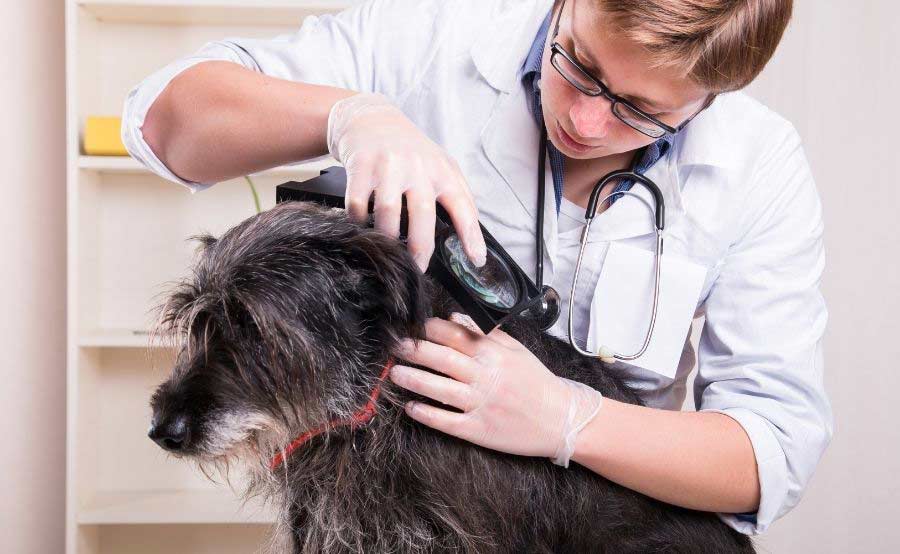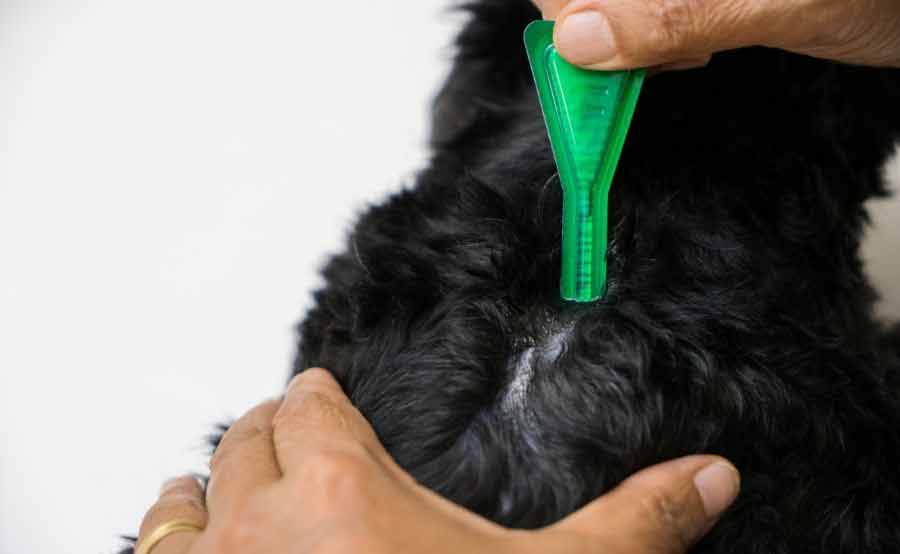
 Most dogs will be plagued by some type of parasite in their lifetime. External and internal parasites can cause everything from mild itchiness to life-threatening conditions. And some parasites in dogs can even infect humans. We’ll give you an overview of the most common dog parasites, ways your pup can get them, and how to treat and prevent them.
Most dogs will be plagued by some type of parasite in their lifetime. External and internal parasites can cause everything from mild itchiness to life-threatening conditions. And some parasites in dogs can even infect humans. We’ll give you an overview of the most common dog parasites, ways your pup can get them, and how to treat and prevent them.
Article Overview
Contents
What Are Parasites?
The Centers For Disease Control and Prevention defines a parasite as “an organism that lives on or in a host organism and gets its food from or at the expense of its host.” Parasites are quite common in dogs, but many are easy to prevent, so it’s best to be informed about how you can keep these pests at bay.
Types Of Parasites In Dogs
There are two main categories of dog parasites:
- External – live on the outside of the body
- Internal – live inside the body. Most internal parasites live in dogs’ intestines, with one major exception — heartworms, which infect the heart and lungs.
How Do Dogs Get Parasites?

Dogs can contract parasites in several different ways. One of the most common means of transmission of fleas, lice, and mites is through direct contact with an infected animal (or through shared bedding, collars, etc.). Dogs pick up ticks from the woods, bushes, or tall grasses.
Intestinal parasites are usually transmitted when a dog eats or licks feces, soil, grass, or food or drinks water contaminated with parasitic eggs. Puppies can also contract roundworms and hookworms through the mother in utero or the mother’s milk. Dogs can get tapeworms from ingesting an infected flea, and they get heartworms from the bite of an infected mosquito.
Symptoms Of Parasites In Dogs

The signs of parasites in dogs differ depending on what’s infested your dog. However, the signs of external parasites can be similar in many cases. Likewise, both worm and non-worm intestinal parasites can cause many of the same symptoms.
| External | Intestinal | Heartworms |
| Excessive scratching | Diarrhea | Persistent coughing |
| Red, inflamed skin | Vomiting | Labored breathing |
| Dry, flaky skin | Loss of appetite | Lethargy |
| Dry coat | Weight loss | Decreased appetite |
| Hair loss | Bloated abdomen | Weight loss |
| Black specks in fur (flea dirt) | Decreased activity | Bloated abdomen |
| Black debris in ears (mites) | Scooting, itching around the anus (tapeworms) | |
| Parasites in poop (tapeworms, roundworms) | ||
| Worms in vomit (roundworms) | ||
| Coughing, difficulty breathing (roundworms)* |
*Roundworm larvae can migrate to the lungs and cause respiratory symptoms and even pneumonia in some cases.
Diagnosis

Most external parasites are pretty easy to diagnose because they’re usually visible on your dog’s skin or in his ears in the case of ear mites. However, mange mites that infect your dog’s skin are too small to see with the naked eye, so your vet will take skin scrapings to examine under a microscope to detect them.
A blood test is required to identify a heartworm infestation. In the case of intestinal parasites, your vet will typically require a fecal sample as well as a physical examination because many different parasites can cause gastrointestinal (GI) issues.
How To Get Rid Of Parasites In Dogs

Dog parasite treatment depends on the type your dog has. But no matter the type, early detection and treatment are crucial to avoiding an infestation of fleas, lice, and mites and severe health problems caused by ticks, heartworms, and intestinal parasites.
In severe cases, dogs are at a high risk of anemia, dehydration, or secondary internal or skin infections. If you suspect any parasite, you should consult with your vet to get the proper diagnosis and treatment for your pup.
External Parasites

For mange mites, your vet will prescribe the best medicine to kill them. In some cases, you can use a medicated antiparasitic shampoo for dogs to help relieve symptoms from external parasitic infections. For ear mites, your vet may prescribe a topical medication, like Revolution, that you apply to the inside of your dog’s ear to kill the mites.
Intestinal Parasites
 There is no single dog parasite medicine that can treat all GI parasites. Once your vet identifies the specific parasite, they’ll give your pup the most effective treatment. In the case of roundworms, hookworms, tapeworms, and whipworms, your vet will recommend a dewormer medication, like Panacur–C. Other oral medicines are effective in killing the Coccidia and Giardia parasites.
There is no single dog parasite medicine that can treat all GI parasites. Once your vet identifies the specific parasite, they’ll give your pup the most effective treatment. In the case of roundworms, hookworms, tapeworms, and whipworms, your vet will recommend a dewormer medication, like Panacur–C. Other oral medicines are effective in killing the Coccidia and Giardia parasites.
Heartworms
Heartworm treatment is complex. Dogs first need to be kept confined and inactive because activity speeds up heart and lung damage. Depending on how far the infection has progressed, your vet may need to stabilize your pup with steroids, heartworm preventives, or antibiotics before treatment.
Then, your dog will receive a series of injections of FDA-approved Immiticide (melarsomine) to kill the adult heartworms, which could last 30 to 60 days. During this time and for at least 30 days after the last injection, dogs must get complete rest and remain inactive. In severe cases, surgery may be necessary to remove the worms.
Prevention

The good news is that there are many preventative medications you can give your dog to stave off pesky parasites.
Fleas, Ticks, Lice & Tapeworms
The best way to prevent fleas, ticks, chewing lice, and tapeworms (since dogs get tapeworms from eating infected fleas) is to use flea and tick preventative medication regularly.
Ear Mites

Heartworms, Roundworms, Hookworms & Whipworms
Giving your dog monthly heartworm medication (oral or topical) is the best way to prevent heartworms, roundworms, hookworms, and whipworms. Some of the most commonly used heartworm preventative medications include:
Giardia And Coccidia
Unfortunately, there’s no preventative medication you can give your dog to prevent him from getting Giardia infections or coccidiosis. But there are some measures you can take to help keep these parasites away. These steps also help keep your dog protected from other intestinal parasites.
- Keep infected dogs away from other dogs.
- Don’t let your dog drink from puddles, lakes, or other untreated bodies of water, especially if the water is stagnant.
- Clean up dog poop immediately, and avoid areas where there’s a lot of dog feces on the ground.
- If you have to board your dog, make sure the kennel practices proper hygiene and keeps its crates, runs, and yards free of feces.
Frequently Asked Questions
Here are some of the most common questions we get from our readers about dog parasites.
What Are The Most Common Puppy Parasites?
Puppies are just as susceptible as adult dogs to all of the parasites we discuss in this article. Out of all of these, the most common in puppies are roundworms. A majority of puppies have traces of roundworms or roundworm eggs in their tissue at birth, but they can also contract roundworms from their mother’s milk. For this reason, veterinarians and breeders commonly administer dewormers to young puppies.
Do Dogs Get Worms In Their Skin?
Worms in a dog’s skin are possible but rare. A roundworm species, Dracunculus insignis, can infest the tissue beneath the skin of a dog’s legs. Signs include red ulcers on the skin’s surface and swollen, snake-like tracks under the skin. Although extremely rare, dogs can contract D. insignis from small lakes and shallow, stagnant water.
Also rare, Pelodera dermatitis is a skin infection caused by the larvae of a roundworm species called Pelodera strongyloides that invades the skin. The affected skin is red with patchy hair and may have bumps, ulcers, or pus-filled lumps. These larvae are present in decaying organic matter and on the surface of moist soil. Dogs with healthy skin aren’t usually at risk of developing an infection.
What Parasite Causes Green Poop In Dogs?
A Giardia infection in dogs can often cause chronic diarrhea with a greenish color. If you notice that your dog’s stool is green, it’s important to get veterinary attention. Giardiasis is particularly dangerous for puppies, immunocompromised dogs, and senior dogs.
Can Humans Get Parasites From Dogs?
Fleas, ticks, and lice can all transmit easily to humans. And some internal dog parasites can affect humans, although those cases are fairly rare. See more information in the brief video below.
Shop Online To Save Money On Preventative Meds & More
Speak to your vet to get advice on the best over-the-counter preventative medications. Most vets will offer medicine for you to take home with you, but you can also save a lot of money by purchasing preventative parasite medicine online. You can also protect your family from backyard parasites by getting the best pooper scooper and poop bags.
Disclaimer: This website contains reviews, opinions and information regarding products and services manufactured or provided by third parties. We are not responsible in any way for such products and services, and nothing contained here should be construed as a guarantee of the functionality, utility, safety or reliability of any product or services reviewed or discussed. Please follow the directions provided by the manufacturer or service provider when using any product or service reviewed or discussed on this website.